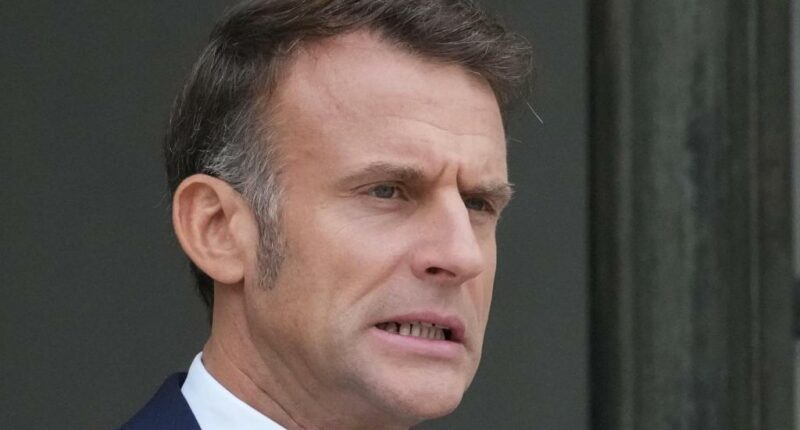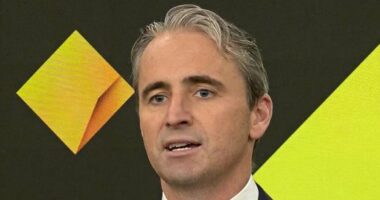Share this @internewscast.com
PARIS (AP) — Following a week of political upheaval, French President Emmanuel Macron is poised to name a new prime minister on Friday, aiming to overcome the deadlock that has stalled the nation for over a year amid rising economic difficulties and expanding debt.
This decision is regarded as Macron’s final opportunity to revive his second term, extending to 2027. Lacking a majority in the National Assembly to advance his initiatives, Macron encounters escalating criticism, even from his own political faction, and has limited flexibility.
Former Prime Minister Sébastien Lecornu unexpectedly stepped down on Monday, just hours post the announcement of a new Cabinet, which faced opposition from a key coalition partner. This surprising resignation led to demands for Macron to either step down or dissolve parliament once more. However, these demands were ignored, with Macron declaring on Wednesday his plan to appoint Lecornu’s replacement within 48 hours.
After discussions lasting over two hours with Macron on Friday, political party leaders expressed uncertainty regarding the French leader’s next move and the potential choice for prime minister. Some leaders warned that selecting another prime minister from Macron’s delicate centrist group might lead to rejection by the robust lower house of Parliament, extending the stalemate.
“How can one expect that all this will end well?” queried Marine Tondelier, chief of The Ecologists party. “It seems the more isolated he is, the more inflexible he becomes.”
Worried investors
Throughout the past year, Macron’s consecutive minority governments have fallen rapidly, entrenching the European Union’s second-largest economy in a state of political stagnation. As of the first quarter of 2025, France’s national debt reached 3.346 trillion euros ($3.9 trillion), equivalent to 114% of its GDP.
France’s poverty rate also reached 15.4% in 2023, its highest level since records began in 1996, according to the latest data available from the national statistics institute.
The economic and political struggles are worrying financial markets, ratings agencies and the European Commission, which has been pushing France to comply with EU rules limiting debt.
Uncertainty surrounds the choice of the next PM
Macron, a centrist, could break with his habit and pick a figure from the left, which formed a coalition in the 2024 legislative elections. But left-wing opposition leaders said after the talks with Macron that he doesn’t appear to be leaning in that direction.
The two biggest opposition parties in the National Assembly — the far-right National Rally and the far-left France Unbowed party — weren’t invited to the discussions. The National Rally wants Macron to hold fresh legislative elections and France Unbowed wants him to resign.
Macron could also opt for a technocratic government in an attempt to sidestep partisan deadlock. He also has the option of re-appointing Lecornu, who has said that he’s not seeking the job but who remains a loyal ally and spent weeks before his resignation trying to build consensus around a budget.
Lecornu argued earlier this week that Macron’s centrist bloc, its allies, and parts of the opposition could still clump together into a working government. “There’s a majority that can govern,” he said. “I feel that a path is still possible. It is difficult.”
In any case, the new prime minister will have to seek compromises to avoid an immediate vote of no confidence and may even be forced to abandon an extremely unpopular pension reform that was one of Macron’s signature policies in his second presidential term. Rammed through parliament without a vote in 2023 despite mass protests, it gradually raises the retirement age from 62 to 64. Opposition parties want it to be scrapped.
The political deadlock stems from Macron’s shock decision in June 2024 to dissolve the National Assembly. The snap elections produced a hung parliament, with no bloc able to command a majority in the 577-seat chamber. The gridlock has unnerved investors, infuriated voters, and stalled efforts to curb France’s spiraling deficit and public debt.
Without stable support, Macron’s governments have stumbled from one crisis to the next, collapsing as they sought backing for unpopular spending cuts. Lecornu’s resignation, just 14 hours after announcing his Cabinet, underscored the fragility of the president’s coalition amid deep political and personal rivalries.
Originally Published: October 10, 2025 at 1:57 PM EDT





















